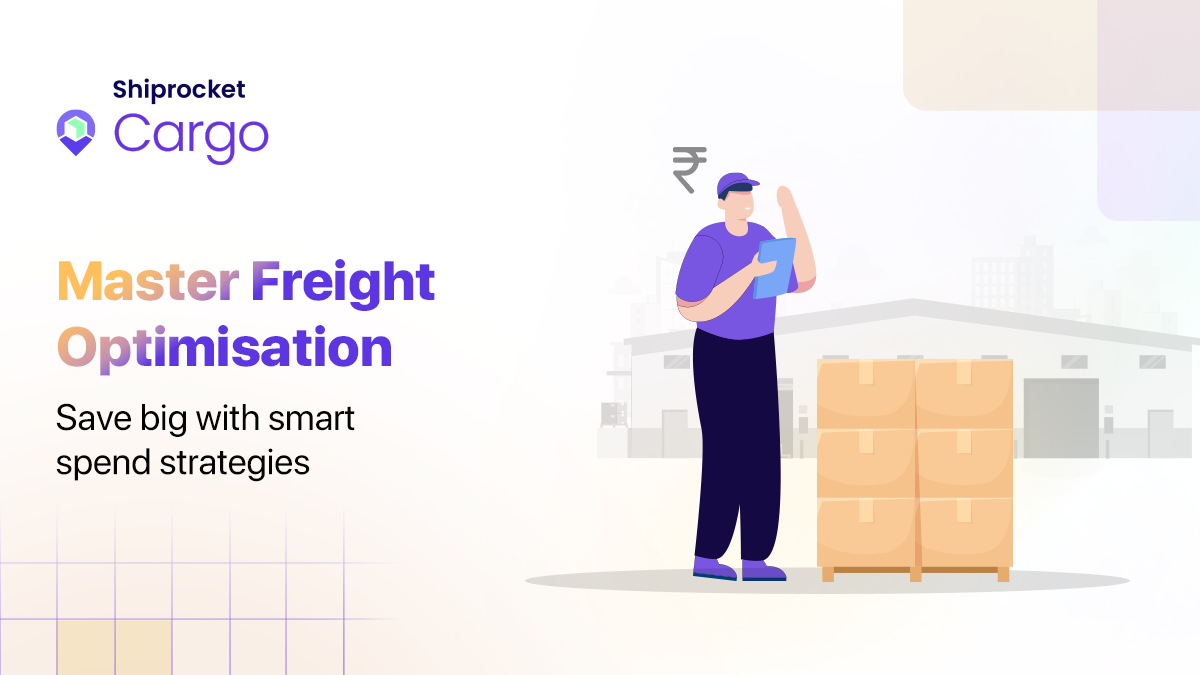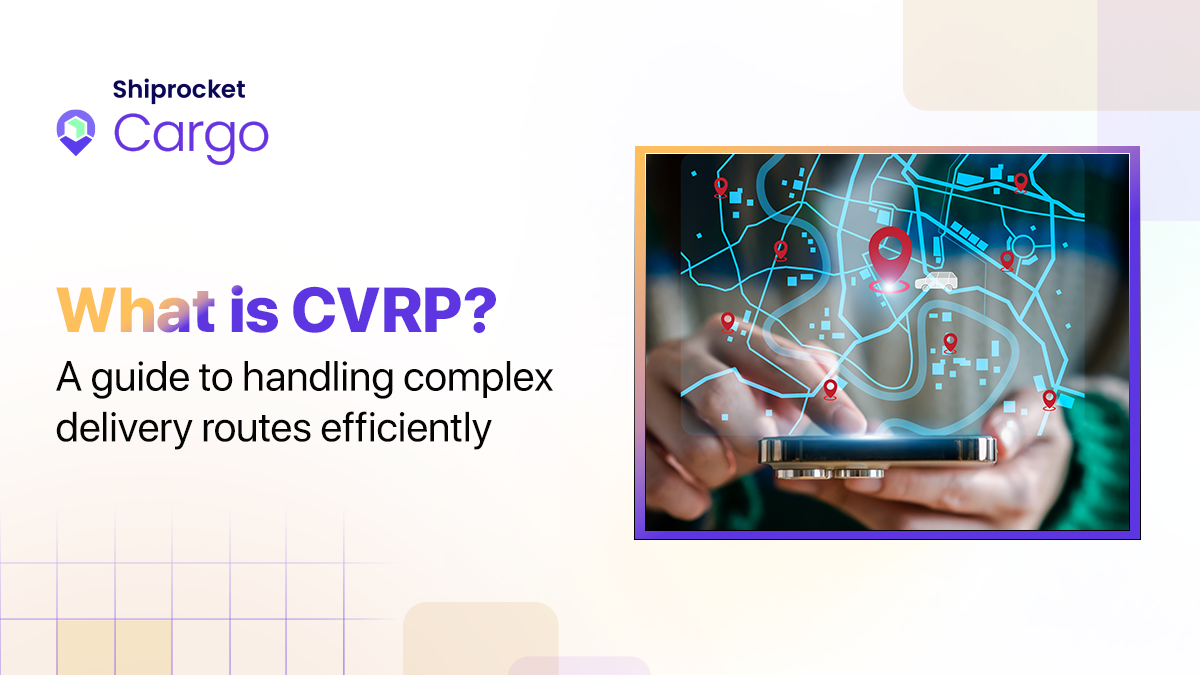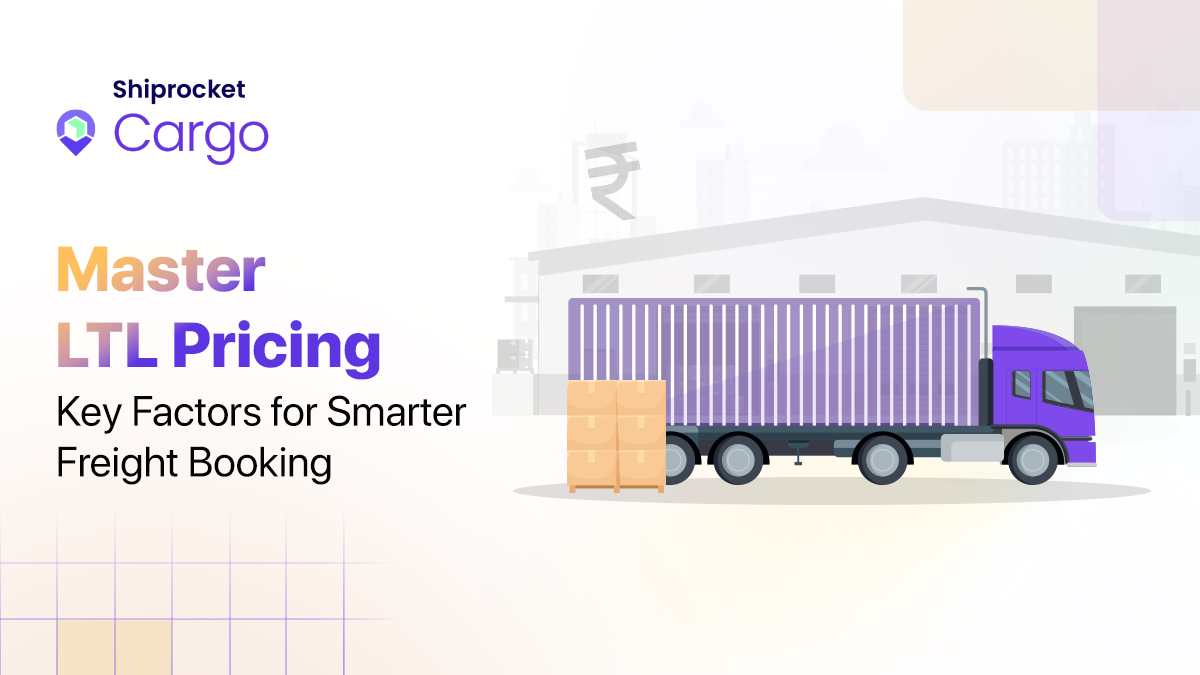How FMCG Logistics is Driving Growth in a Competitive Market
- What Does FMCG Logistics Mean in the Supply Chain?
- How is the FMCG Logistics Market Growing Worldwide and in India?
- What are the Key Challenges in FMCG Logistics?
- How do FMCG Logistics Companies Operate to Meet Market Demands?
- What Role Does Technology Play in Transforming FMCG Logistics?
- What are the Benefits of Strong FMCG Logistics for Businesses and Consumers?
- How Does Shiprocket Cargo Support FMCG Businesses with Scalable Logistics Solutions?
- Conclusion
- FAQs
In a market where customer demands change continuously, smaller businesses often face an uphill task: how to get products to buyers quickly without overspending on logistics. Relying on slow or outdated delivery networks risks empty shelves, lost sales during peak seasons, and frustrated customers who now expect city-like speed no matter where they live.
A strong FMCG logistics partner changes that. It means timely restocking, smoother last-mile reach, and the confidence that your products will arrive when and where they’re needed.
This blog explores how modern FMCG logistics streamlines supply chains in ways that directly support business growth and customer loyalty.
What Does FMCG Logistics Mean in the Supply Chain?
The Fast Moving Consumer Goods market (FMCG) is the 4th largest contributor to the Indian economy. It includes everyday essentials such as packaged food, personal care products, and household staples; items that must move swiftly through the supply chain due to their high turnover and limited shelf life.
FMCG logistics manages this flow end-to-end: from transporting goods to warehouses, handling inventory, and replenishing stock, to distributing products quickly to retailers and end customers. This seamless transportation is more than an operational demand; it is a critical contributor that directly drives sales, strengthens market presence, and safeguards brand visibility.
How is the FMCG Logistics Market Growing Worldwide and in India?
The FMCG logistics market is expanding rapidly, driven by changing consumer behaviour and the rise of eCommerce.
Globally, eCommerce is changing how goods move from factories to shelves, demanding that the FMCG logistics market be agile and efficient. Here are some important figures, indicating the growing logistics demand in the FMCG sector:
- The global logistics market was at US$1,217 billion in 2024.
- The market is projected to reach US$1,643.5 billion by 2023.
- Tech-enabled strategies, such as real-time tracking, cold-chain expansion, and demand forecasting, are further boosting the efficiency of the FMCG logistics companies.
India’s Growth Story:
- India’s FMCG logistics is being reshaped by quick commerce players such as Blinkit, Zepto, and Swiggy Instamart.
- These platforms have raised consumer expectations, making faster restocking and seamless last-mile delivery essential for businesses.
- Efficient supply chain management is now critical for keeping pace with demand surges and ensuring products reach warehouses and retailers on time.
What are the Key Challenges in FMCG Logistics?
The FMCG logistics market is growing rapidly, and so is the number of distribution networks, SKUs, and customers. Here are some of the challenges that you can face in everyday operations:
Rising SKU (Stock Keeping Unit) Complexity
Even a small store or regional seller can have hundreds of product variations, from different pack sizes to flavours. Without proper logistics, it is easy to mismanage stock, run out of popular items, or overstock slow-moving ones.
Seasonal And Festival Demand Surges
FMCG demand fluctuates sharply during festivals, weekends, or promotional events. A small seller may struggle to keep popular sweets or beverages in stock during Diwali or summer months. Overstocking risks expiry, while understocking leads to missed revenue.
Overcoming Delivery and Storage Gaps
Small towns and suburban areas often lack proper storage facilities, smooth road connectivity, or cold-chain support. This can lead to spoilage of perishable items or delayed deliveries, directly impacting your reputation and revenue.
Sustainable Supply Chains
Customers are now choosing brands that care about the environment. For sellers, this means using eco-friendly packaging, optimising delivery routes, and storing products in energy-efficient warehouses.
How do FMCG Logistics Companies Operate to Meet Market Demands?
Although the supply chain management can be complicated, efficient FMCG logistics companies move quickly to match consumer demand. Here’s how:
Strategic Distribution Networks
FMCG companies use hub-and-spoke models, where central warehouses supply regional stores. This allows faster restocking and smoother deliveries.
Use of Data and Technology
- Demand Sensing: Predicts fast-selling products using sales data and factors like festivals or promotions.
- Automation and Real-Time Tracking: Warehouse systems and digital tracking speed up operations and let sellers monitor shipments.
Inventory and Order Fulfillment
- Just-in-Time (JIT) Inventory: Products are delivered as needed to avoid overstocking.
- Vendor-Managed Inventory (VMI): Suppliers monitor and refill stock directly at stores.
- Cross-Docking: Products move directly from incoming to outgoing transport without long storage, reducing delays.
Agility and Partnerships
Agile delivery vehicles and collaborations with local distributors or third-party logistics (3PL) providers help sellers reach remote areas efficiently.
What Role Does Technology Play in Transforming FMCG Logistics?
Technology is crucial in addressing challenges faced by FMCG sellers, ensuring products reach customers on time and in good condition.
- Improved Visibility
Real-time tracking tools allow sellers to monitor shipments and detect delays early. For example, a local retailer can see if a delivery of dairy products will arrive on schedule and plan sales accordingly.
- Greater Efficiency
Automation in warehouses speeds up picking, packing, and sorting, reducing manual errors and costs. This ensures sellers receive the right quantity and quality of goods without mistakes.
- Enhanced Adaptability
Digital systems allow logistics partners to adjust delivery schedules or reroute shipments quickly. For instance, if a road is blocked, fresh produce can be redirected to another route to avoid spoilage.
- Better Collaboration
Integrated communication platforms enable real-time sharing of inventory, delivery status, and demand estimation among manufacturers, distributors, and retailers. This helps sellers plan promotions, restock faster, and maintain consistent product availability.
What are the Benefits of Strong FMCG Logistics for Businesses and Consumers?
A efficient FMCG logistics network ensures products reach customers efficiently while helping sellers optimise costs and grow sales.
For Businesses
- Market Integration: An extensive supply chain management lets brands reach their customers everywhere. Companies like HUL, ITC, and Amul operate a massive network across regions to successfully capture the market.
- Competitive Pricing: An efficient FMCG logistics chain reduces the operational cost and enables brands to lower their prices. That’s how they offer better prices in the market without hindering the product quality.
For Customers
- Easy Availability: An efficient FMCG logistics company ensures that products reach store shelves on time, eliminating stockouts. Customers can purchase their favourite products without being disappointed.
- Low Prices: Smooth supply chain management saves operational costs, enabling brands to offer their products at competitive rates.
How Does Shiprocket Cargo Support FMCG Businesses with Scalable Logistics Solutions?
A strong supply chain is crucial for any FMCG business, ensuring products reach customers on time and in perfect condition. Partnering with an FMCG logistics company like Shiprocket Cargo helps achieve this with AI-driven technology and a wide delivery network.
With pan-India coverage and real-time tracking, Shiprocket Cargo prevents shipment delays and ensures smooth last-mile delivery. Sellers also receive electronic proof of delivery (ePOD) and notifications for any failed deliveries (NDR), helping manage operations effectively and maintain customer satisfaction.
Conclusion
FMCG logistics is more than moving products. It directly impacts your sales, customer trust, and business growth. By adopting technology-driven supply chain solutions, sellers can reduce delays, prevent stockouts, and lower costs while maintaining product quality.
Partnering with a digital-first logistics provider like Shiprocket helps you achieve this, giving your business the flexibility to scale, respond to demand changes, and stay competitive in a fast-moving market.
Get started with Shiprocket Cargo today and ensure your products reach every customer on time.
FAQs
Rising consumer demand, increasing urbanisation, growing disposable incomes, and digital commerce adoption are key drivers, creating opportunities for sellers to expand product reach and improve sales.
An FMCG logistics company integrates a hub-and-spoke model to send goods from one point to multiple delivery points.
The logistics company oversees the transportation of goods between the warehouse, retailer, and distributor.
No, it is not possible to deliver your goods to the QCommerce warehouse without a reliable FMCG logistics company.
Yes. Logistics partners provide access to pan-India networks, cold-chain storage, and timely replenishments, enabling smaller sellers to compete with larger brands and expand into new markets.



